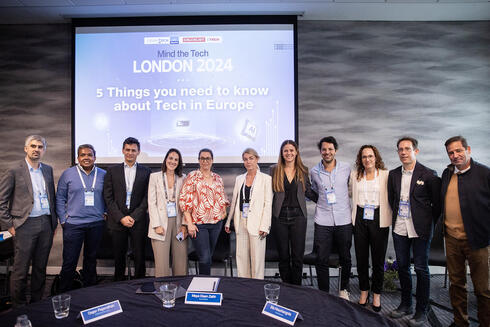
Mind the Tech London 2024
"Israeli start-ups skip Europe almost completely"
The participants in the roundtable at Calcalist and Bank Leumi’s Mind the Tech London conference included senior executives from the high-tech and finance industries who discussed why the U.S. is seen as the first and preferred destination for raising capital among Israeli companies
In the world of Israeli entrepreneurship, the United States is often seen as the first and preferred destination for expansion and raising capital. However, are Israeli companies thereby missing out on significant opportunities in Europe? In a panel held at Calcalist and Bank Leumi’s Mind the Tech London conference, senior executives from the high-tech and finance industries discussed this issue, and expressed their thoughts on the challenges and opportunities in Europe.
Maya Eisen Zafrir, CEO of LeumiTech, opened the discussion and said: "When we gather here, we have a big challenge. The current high-tech system in Israel is on autopilot for the U.S. There may be good reasons, but something does not resonate well, especially in the type of market we are in. Venture capital is not at the same level as it was in 2021 and 2022. Israel is experiencing specific challenges. I think it's part of our job in this conversation to discuss the opportunity in Britain and Europe and try to get all the different opinions. I don't want to call it tips, but ideas about the opportunity for Israeli startups to raise funds in Europe."
Gajan Rajanthan, a partner at Highland Europe, opened with an interesting statement: "When Israeli startups think about fundraising, they see Europe as the poor cousin of the United States." He explained that the reason for this lies in the fact that the American market offers one language, 300 million consumers, and a long tradition of ties with Israel. "But this is an expensive geography. In many ways, the sales team needs to be duplicated and one of the founders transferred there, which is a hindrance. And, it's also a lot of cash burning when you're at an early stage."
Despite the challenges, the participants in the discussion pointed to a number of significant advantages of the European market, first and foremost the geographical proximity. According to Rajanthan, "You can be at Ben Gurion Airport in 4 hours, right? Many companies in Germany, France, Britain buy cyber security from Israelis."
The costs are also lower. According to the participants, setting up an operation in Europe may be cheaper than the U.S., especially in early stages. Also, Rajanthan noted that linguistic diversity isn't necessarily a bad thing. "The beauty of the Israeli diaspora is that you will always find a German or Italian speaker somewhere, right?", Rajanthan said.
When it comes to regulation, in certain sectors, such as fintech, approval in one EU country gives access to all 28 countries. Rajanthan explained: "If you get a passport for one of the European countries, you can just sell it in 28 countries, which is quite simple, compared to a money transfer business in the U.S. which has to get reauthorized in all 50 states."
Shahar Tzafrir, managing partner at TLV Partners, presented the other side of the coin: "I checked before this meeting, and out of 20 or so companies whose boards I am on, only three have actually opened a headquarters in Europe, in the UK." He added: "And all the others just skip Europe completely. I mean, it's almost automatic that they move to the United States, maybe to Asia, but Europe stays behind."
Guy Fighel, partner and head of data and AI, at Hetz Ventures said: "Foreign venture capital funds operate in Israel in two main ways: one, well-known funds with a local presence, which attract Israeli entrepreneurs thanks to their reputation, and establish relationships through visits and public activity in Israel; the second are established foreign funds without a presence in Israel, which focus on areas such as fintech and automobiles, reach Israeli entrepreneurs through local angel investors, who connect them and help build business relationships."
However, unlike the U.S., Europe is made up of many countries with different languages and cultures. It also has complex labor laws. Jonathan Atha, a partner at Meitar Law Firm, explained: "In France there are workers councils. Employees have the right to make an offer, a right of first refusal to buy a business." Also, the regulation is complex and may be complicated and different from country to country.
Alex Konoplyasty, founding partner at Flashpoint Venture Capital, highlighted the opportunities in the field of mergers and acquisitions (M&A) in Europe, especially in the UK: "I think one of the missed opportunities is around M&A activity, because I think if you go to the American market, it means that your team is English-speaking. That means the software is in English, so Britain becomes a natural place."
Sia Houchangania, a partner at Seedcamp, emphasized the quality of the workforce in Europe: "When you look at the quality of talent in areas such as artificial intelligence in the UK or Paris, or when it comes to robotics in dark tech, there is world-class talent coming out of universities in Munich or Zurich."
Dafna Lieber, a partner at Ernst & Young, offered a different strategy: "I think that in this context, a British company, which also aligns with corporate elements and business elements, would be the right answer from a tax point of view as well."
The participants suggested several additional strategies:
1. Flexibility in employment - Houchangania suggested: "There are also ways in the short term to employ some of these people under more time-limited contracts."
2. Targeting talent - Utilizing the unique talent in different regions of Europe.
3. A gradual approach - Starting with a British company and gradually expanding to other countries.
Eisen Zafrir summed up the discussion: "I wonder who is more globally oriented, a European or an Israeli entrepreneur?" This question emphasizes the great potential of Israeli companies in the European market, while recognizing the unique challenges."
Although the United States remains an attractive destination for Israeli startups, the discussion highlighted that Europe offers significant opportunities that are often missed. The advantages of geographic proximity, lower costs, and unique talents in certain fields, position Europe as an important strategic option for expansion.
In the end, success in Europe may depend on the ability of Israeli companies to adopt a flexible and adapted approach, which takes advantage of the unique advantages of the European market while creatively dealing with the challenges it poses.














